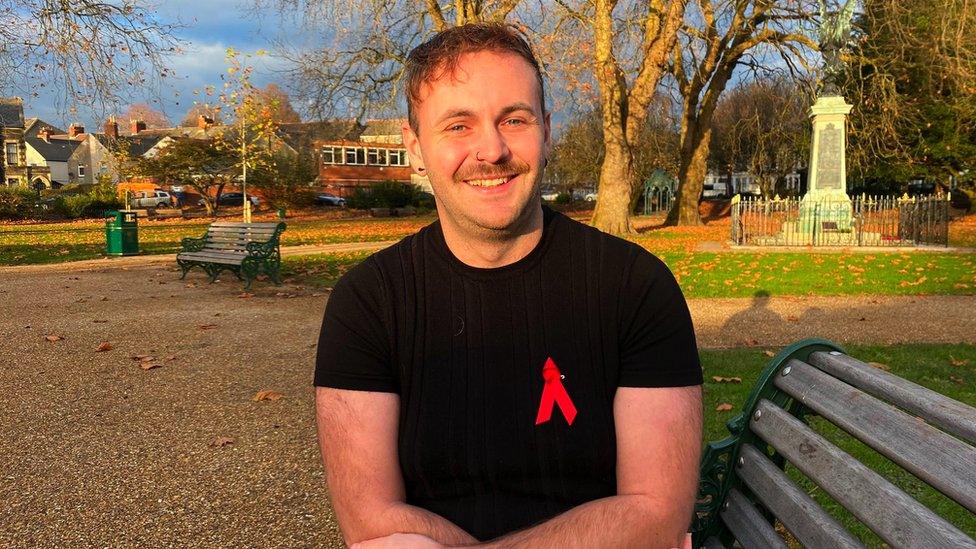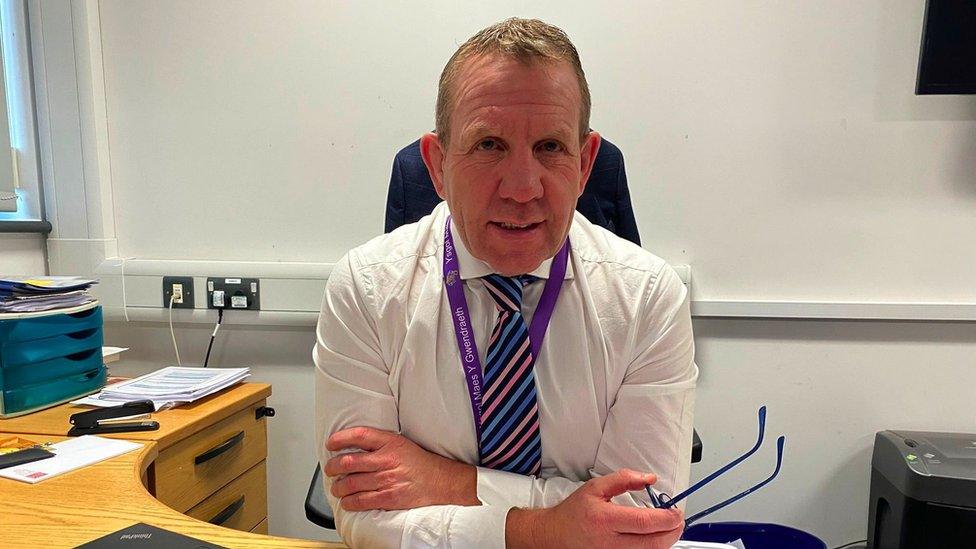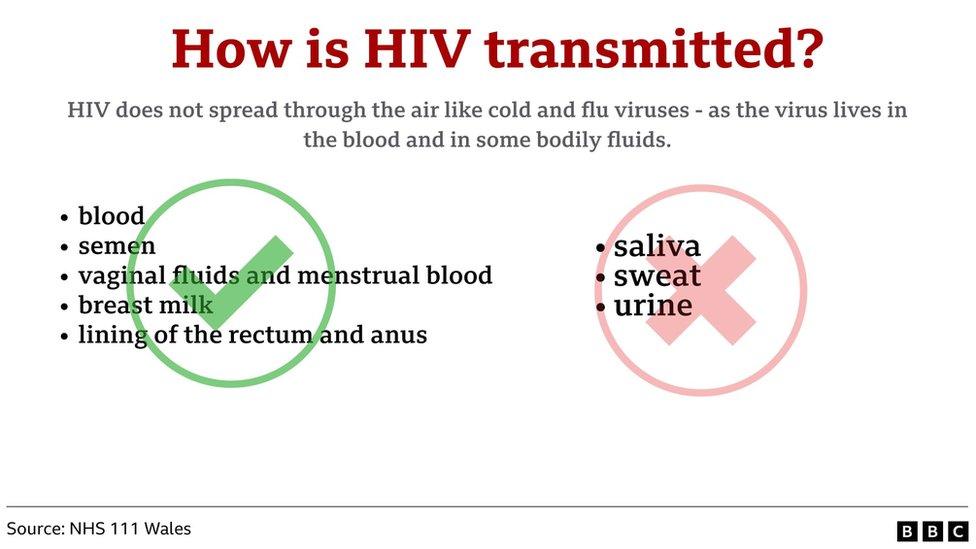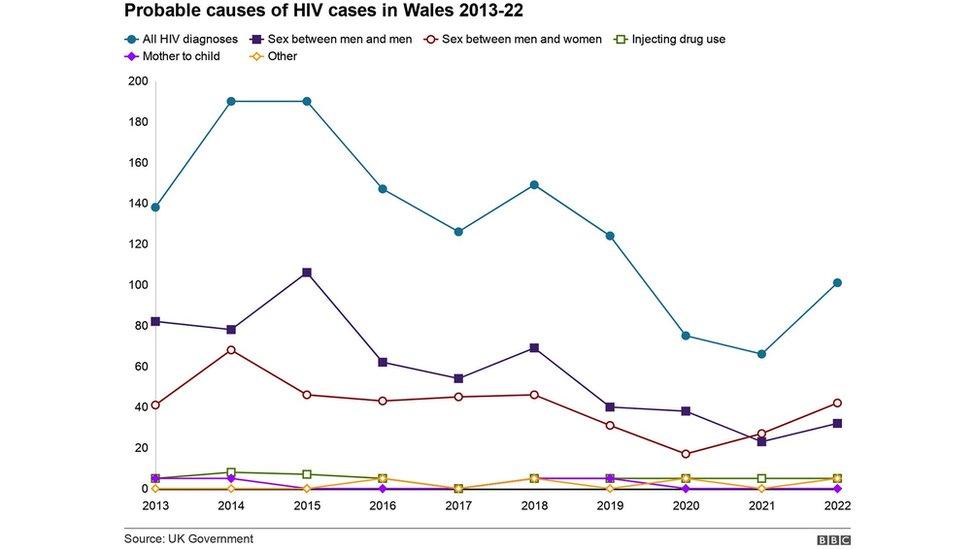Can talking about HIV in schools help to end stigma?
- Published
Neil thinks that the stigma around HIV could be reduced with better education
As a child of the 80s and 90s, HIV was not something Neil heard much about from teachers or at home.
The stigma attached to the condition meant he did not realise how much support was available for those living with HIV.
And despite learning more about the virus as a prison officer, he was still floored upon being diagnosed with it two years ago.
But the 42-year-old from Carmarthen thinks that the stigma around HIV could be reduced for others with better education about it at an earlier age.
"There was a stigma around it years ago. There wasn't medication," he said.
"Science has come so far now that we can move on with our lives. We don't need to be hiding or shying away because you're supported. Help is there for you as well."
With the launch of the Welsh government's HIV Action Plan for Wales, external in 2023, Wales became the first UK nation to pledge to end new cases of HIV by 2030.
Schools in Wales are offered Relationships and Sexuality Education (RSE) resources through the Welsh government's RSE toolkit and Hwb.
But curriculum resources for schools which address HIV and prevention drug PrEP (pre-exposure prophylaxis) are yet to be developed.
Extra education materials that are sourced by schools are required to be in line with the Welsh government's RSE Code - meaning they must be developmental stage-appropriate.

Ash Lister says RSE was 'very basic' when he was at school
Ash Lister, a councillor in Cardiff and chair of Fast Track Cardiff & Vale, which runs HIV education campaigns, said he trained himself in RSE after he left school without receiving much in the way of teaching about it there.
"All I can remember from school is conversations around pregnancy and contraception," he said.
"When I reflect on my knowledge and understanding now - there was no discussions around HIV. It was very basic."
Ash said he was worried that current teachers, who received the same education during their schooldays, would not feel comfortable creating extra resources for RSE lessons.
"If you haven't had that yourself then you're not going to feel confident in doing it."
But some organisations like Brook, which can be commissioned by schools to develop RSE resources, said the toolkit was not always enough.
Kelly Harris, Brook's head of participation, said delivering RSE lessons was an extra pressure on teaching staff's workload, and was concerned that staff may not include information they do not know to teach.
"RSE isn't a standalone teacher learning subject, like you can train to be a maths teacher or geography teacher," she said.
"We are, within the code, asking them to talk about reproduction, puberty, sexual transmitted infections and HIV. People might not necessarily feel particularly knowledgeable.
"Because teachers are scared of potential backlash from communities or worry from parents about what is being taught, people are more nervous around teaching it."
One school that has worked with Brook to enhance their RSE curriculum is Ysgol Maes y Gwendraeth in Llanelli.

Headtecher Alwyn Thomas' Ysgol Maes y Gwendraeth school has used Brook to enhance RSE
Headteacher Alwyn Thomas said that RSE was a challenging topic to deliver, but feedback had been positive from lessons using resources from Brook to build on the government's toolkit.
"Brook is a dimension which enhances it even more and gives better depth and understanding to our children to make informed choices," he said.
"It offers such an important dynamic dimension to the RSE curriculum which enhances our own curriculum - and that is so important."
The Welsh government said: "[RSE] is mandatory for all pupils and helps learners understand the causes, symptoms and impacts of HIV.
"We will soon develop curriculum resources for schools which address HIV, PrEP and stigma."

In Wales, HIV home testing kits, external are available by post and are delivered discreetly.
Numbers of new HIV diagnoses in Wales have been on a general decline in the last decade, other than a small rise in 2018 and another following Covid-19 lockdowns.
However, government data, external released in November showed that most people diagnosed with HIV in Wales since 2013 reported sex as the probable exposure category.

The latest data shows that most new cases of HIV in Wales were likely caused by sex
Most recently in 2021 and 2022, the number of people reporting sex between men and women as the probable cause of their HIV was higher than any other exposure category for the first time since diagnoses have been recorded.
Dr David Gillespie from Cardiff University researches the use of HIV prevention drug PrEP, and said this shift may be due to a lack of knowledge about prevention and transmission of HIV in different communities.
"HIV can affect anyone. However, prevention measures have historically been geared towards a small group of people and I'd argue, inappropriately," he said.
"I still think there's probably a knowledge gap among many communities that they are at any risk of acquiring HIV."
He added that this was something that the HIV Action Plan for Wales was trying to tackle.
Involving community groups in the promotion of HIV testing and prevention was "one approach that might help with increasing access to prevention methods like PrEP", he said.
Adam Williams, a PhD researcher into PrEP at Cardiff University, said normalising testing alongside other sexually transmitted infections would also help to raise awareness.
"One thing we often talk about is not siloing HIV and exceptionalising it," he said.
"If we're going to target one [STI], it's easier if we can get them to test for everything at once."
Public Health Wales recently looked at HIV and awareness in Wales in their Time to Talk survey, external, released in December.
Researcher Dr Catherine Sharp said its findings were "really positive".
She pointed out that 84% of the 1,094 respondents said they would speak to a healthcare professional about HIV if they felt they needed to.
"It does show an attitude and willingness to have conversations about testing and treating of HIV," she said.
Yet she acknowledged the data did not show exactly how people may feel when talking about HIV.
"It would be important to understand how confident people feel to go and have these conversations, and we can't understand that from this existing data set," she added.
"We'll use these findings to inform our work and the next steps that we do here in Public Health Wales."
The Hywel Dda health board in Neil's area has been asked to comment.


- Published14 June 2022

- Published23 November 2021

- Published2 March 2022
